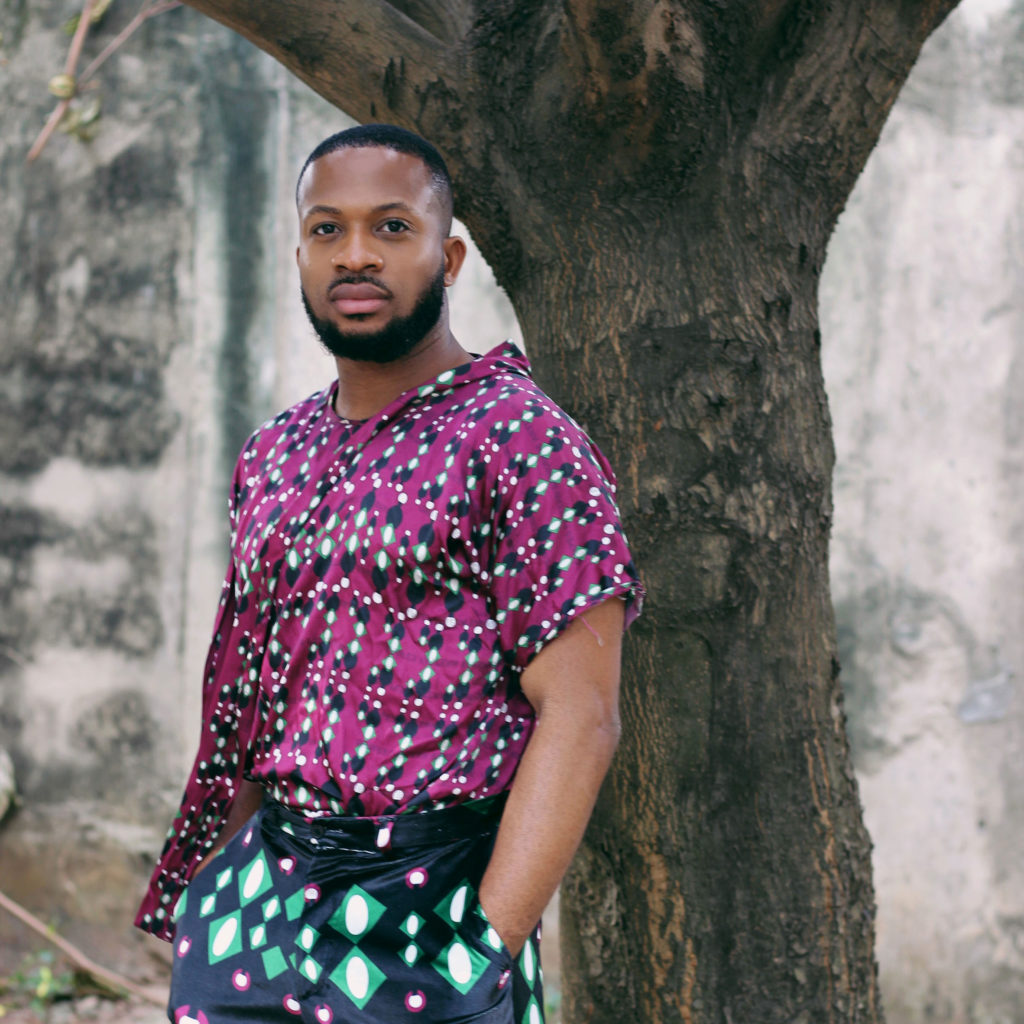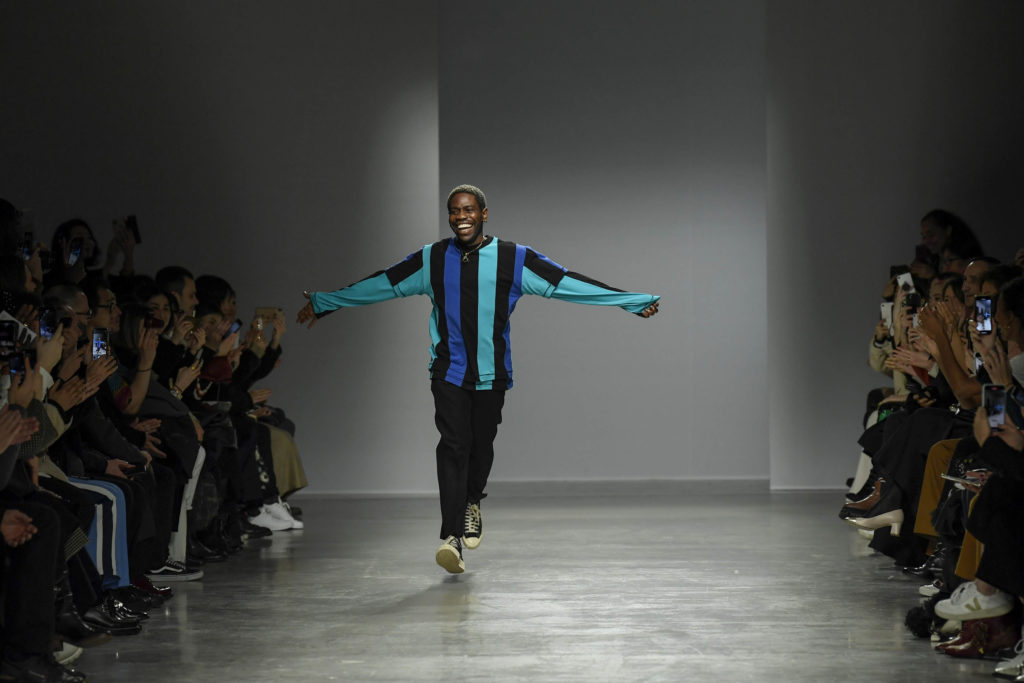Models present creations by Cynthia Abila during the Lagos Fashion Week in 2018. Stakeholders who invest in fashion weeks do so to promote Nigeria’s fashion industry. (Pius Utomi Ekpei)
COMMENT
During the last quarter of the year, Nigeria’s commercial capital, Lagos, becomes home to a number of arts and culture soirees. It was during last year’s season of fashion weeks, invite only dinner parties and art shows that Adebayo Oke-Lawal caused a stir.
He is the designer and creative director behind the androgynous clothing brand, Orange Culture. It looks to encapsulate and celebrate fashion in Nigeria while defying the country’s conservative values. As a result of his efforts, 2014 saw Oke-Lawal becoming a finalist for the LVMH prize, an award created to honour and endorse the work of an emerging fashion designer. He has also exhibited at globally revered fashion events such as the International Fashion Showcase held during London Fashion Week and the menswear event, Constellation Africa at Pitti Uomo in Florence.
 Ramped up: Models walk the 2019 Lagos Fashion Week runway in Orange Culture creations. (Pius Utomi Ekpei)
Ramped up: Models walk the 2019 Lagos Fashion Week runway in Orange Culture creations. (Pius Utomi Ekpei)
In addition to Lagos Fashion Week, recent years have seen the creation of other fashion events such as the Guaranty Trust Bank’s GTB Fashion Weekend, Zenith bank’s Style by Zenith and First Bank’s Africa Fashion Week.
Through a series of tweets, Oke-Lawal addressed the Nigerian banks, arguing against the need for more fashion weeks. “So, if banks really want to help, stop wasting money flying designers in from countries that would never fly us out and work on funding platforms that are developing the industry or invest directly in the industry,” he said.
As an alternative means of support, the designer pointed out the many areas where the industry could use funding. These include manufacturing clothes, fashion education, skilled labour, textile manufacturing and developing a sustainable fashion sphere.
Oke-Lawal’s tweets catalysed a continental conversation about the purpose of fashion weeks, especially in the fast-moving and largely digital world that we exist in today.
Since the first fashion week, held in New York in 1943, they have metamorphosed. What used to be a handful of shows displaying garments and accessories to potential customers and stockists has now become a social media spectacle and where there are more people in the industry there to make connections than there are buyers.
Fashion weeks are a portfolio-building platform for fashion and set designers, models, stylists, photographers and freelance writers. In Africa, the fashion weeks offer an opportunity for designers to get attention that may result in international investments.
But, as most things are, it is a bit more complex than that.
For all the visibility and excitement generated during Nigeria’s fashion weeks, the industry appears to be far from sustainable. After a week of standing ovations and international features many designers return home with nothing to show of it.
‘‘The growth of the industry will have a knock-on effect on all [its] players,’’ says Isoken Ogiemwonyi, the editor-at-large of online fashion magazine BellaNaija Style.
She adds that the lack of money in Nigeria’s fashion industry is visible in the way that a fashion designer’s work is disseminated. ‘‘If designers aren’t actually turning a profit, it becomes difficult to assign a healthy budget for anything else; this includes models, photography and marketing.’’
Ogiemwonyi does acknowledge the work of fashion programmes and community upskilling initiatives such as that of Style House Files, a fashion business development agency, and Heineken Lagos Fashion Week’s incubator programme, as well as the British Council’s Creative Enterprise Support programme. “They are a great starting point, but there is more work to be done in both the public and private sectors,” she says
 Adebayo Oke-Lawal of Orange Culture, argue that the industry needs more than fashion weeks to boost it. (Orange Culture)
Adebayo Oke-Lawal of Orange Culture, argue that the industry needs more than fashion weeks to boost it. (Orange Culture)For relatively more established Nigerian fashion brands, it is possible to leverage these fashion weeks for the purpose of marketing and increasing their presence on the international fashion scene. But for emerging fashion brands the possibility of landing features on international fashion platforms is low. For these emerging brands to compete in the international scene they need a sustainable industry structure and funding to upscale production.
‘‘Funding is very important in fashion, especially for African creatives who are still trying to find their footing,” says Nigerian-based stylist and creative director Oluwatosin Ogundadegbe. In the 10 years that he has been in fashion, he has seen how the playing field is not level. Unlike established practitioners, those who are on the come-up need opportunities that go beyond the initial exposure and barely visible platforms on which they exist. The opportunities include “business education and retail access across the globe”.
Even though fashion weeks allow the more established fashion brands to tick the visibility box, it doesn’t necessarily translate to bankable sales. This has led established designers such as Oke-Lawal and Kenneth Ize to speak against them. In an interview with online magazine Magnus Oculus, Ize discussed the efficiency of fashion weeks in Nigeria.
 Nigerian Designer Kenneth Ize acknowledges the audience during the Kenneth Ize show at the Paris Fashion Week earlier this year. (Kristy Sparow/Getty Images)
Nigerian Designer Kenneth Ize acknowledges the audience during the Kenneth Ize show at the Paris Fashion Week earlier this year. (Kristy Sparow/Getty Images)
‘‘I think fashion weeks here, there are too many already. Why do I have to keep running around making this or making that to show? To show for who? To show for who? Who am I really showing this for if my client isn’t really there? I mean I have done shows over four years under Lagos Fashion Week and I don’t think I have gotten a buyer from there one time’’.
What the fashion weeks do manage to do is provide a semblance of structure by creating and maintaining seasonal calendars for designers.
But investors need to invest knowing that this art of crafting beautiful garments and accessories needs a business model that helps practitioners to become financially viable. So as the fashion weeks take place, there’s a need for designers, the media, influencers and all other attendants to question their intentions as do the investors who fund the events.